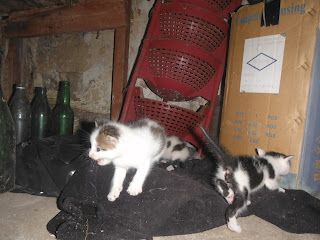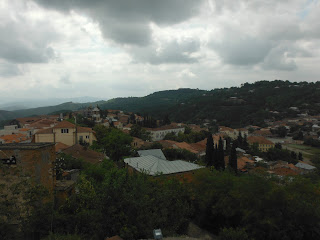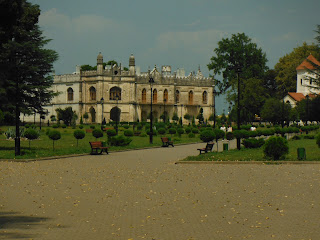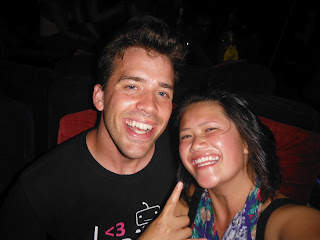My first week of teaching has been stunning, teaching at
this school is fantastic, and I enjoy coming in to work, these two weeks has past
by so quickly, I fear the second half of my stay in Georgia will zoom by before
I realize that it is over. My work schedule is sparse, I teach one or two, and
sometimes three classes a day. I have a lot of free-time in the village, so I
usually come to school early, around ten and leave much later usually at two or
three. While I'm at school, I attend my designated lessons, and sometimes I go
to extra lessons!
Students are very happy to see me. I am accosted frequently
between and during my lessons. I have conversations of varying complexity to
almost student. Some are more shy, and others will jump right out in front of
me with a hearty "Hello! How are you!" or simply speak and try to
explain Georgian to me. I often try to sneak English words into their
vocabulary, often saying "I will see you later" "I am
glad/well/happy." instead of a simple "Good" or "Goodbye."
Inside the classroom, I try not to be too much of a
distraction, regardless if the students would be distracted with out my
presence! Most of my duties inside the classroom consist of helping with
pronunciation or spelling. Both of my co-teachers are adequate in explaining
material, but sometimes will have difficulty in idiomatic expressions and with
pronunciation themselves. Apart from an occasional comment, I try not to
distract too much attention from my co-teachers. They are the main teacher, and
I am their auxiliary. Because they will be their when I leave, I want the
students to have complete confidence in them. Outside the classroom however, I
try to get the students more involved in their English. I challenge their
lexicon and conversational skills.
Walking home is an enjoyment in itself, I often am
accompanied by a party of children and teenagers. We get to speak to each other
much more than at school. Conversations in English are so abundant during these
walks I'm starting to believe that I am doing more help outside of the
classroom than when I am actually working.
School is in remarkable condition, being renovated a few
years ago by an American NGO. My school is made up of thirteen classrooms,
covering two floors, which are connected by two staircases often heavy with
traffic of students uniformed in black and white. Portraits of famous Georgians,
poets, writers, politicians and artists are hung along the staircase walls,
giving their name and birth/death date in Georgian script underneath their
black and white image. The floors of the classrooms are made of unpainted wooden
planks, which make a earthy sound when walked on, and give the rooms a
pleasant, fresh-cut timber smell. The walls of the classrooms are covered in
smooth plaster, painted a pleasant light yellow. In the second-floor common
area, hung from the walls, before and after photographs of the school are
displayed, showing the crumbling facility of only a few years back. The school
has new windows, often open, letting in sunlight and a cool breeze; It being early
fall, my village is still frequently hot during the day. In each classroom are
radiators, newly installed. The students, staff and faculty are very proud of
their renovated school, and have been taking good care of it. Of all the
students I've spoke with, all have a profound respect for their school, and are
keen on showing me their facility often asking me "Do you like our
school?" Already I hold this school as dear as I do the schools of my
childhood. The memories and experiences inside these walls will be cherished.
On the second floor, the teacher's lounge is often loud, but
always the mood of the room is of jubilance. A group of teachers may be
complaining loudly of their students, or laughing about how the new English
teacher speaks Georgian. The school director may be giving a speech, oftentimes
hotly interrupted by another one of the staff. The room's conversations,
speeches and arguments often overlap with each other, it is not uncommon to be
speaking several conversations at once!
A small room, away from the din of the teachers lounge is
the coffee room. On waist-high cabinet, A propane gas burner, a jar of coffee
and a canister of sugar make the coffee station. Second hand tables, desks and
chairs make up its furniture. My co-teacher, our Russian/music teacher take
breaks before and after our lessons here at least once a day. The room is more
peaceful than the teacher's lounge, and we are able to communicate and speak
about things (and gossip about the other teachers)
This week, I attended my other co-teacher, Mariami's class.
Most of the classes I sat in they were about older students, and were
enthusiastic about speaking to me. Classroom was still chaotic, but more English
was spoken. The students are very inquisitive on who I am, and about America. I
try to answer all of their appropriate questions, and ignore the inappropriate,
questions such as: "Do you like Georgian Girls?" or "Do you like
Georgian wine?" are ignored. My future plans at Gorgadzeebi involve me
attending these upper classes, although TLG doesn't allow volunteers to teach
grades 6th thru 12th. The past volunteers must have had disciplinary issues
with the older students, causing complaints. As a result, TLG forbade their
volunteers from having mandatory lessons with the older students. I however,
see no harm in attending, provided my presence in their lectures are productive.
I spent time speaking with the math teacher, about math and
such. She seems enthusiastic about having me be more involved in math classes.
I hope to become more involved in teaching math. If not, I can always start an
English club. Many of the students would benefit tremendously if they had a
quiet place to do their translations and grammar exercises. I hope to set up a
time and place for such a club, my co-teachers think this may be a good idea.
Next week, I'll ask my school director if we can make the arrangements for an
English studying center.
The highlight of the two weeks was when I taught the
children cha cha cha. Ballroom dancing has been my hobby for the last three
years. On Monday, At the request of some of my students, who were interested in
dancing, I showed the basic steps of cha-cha-cha in one of the classrooms after
school. The children are hilarious to watch, but they learned the steps so
quickly! This first lesson was such a success, I must try and make more
lessons, or even start a dance club. When I teach, I teach in English,
introducing new vocabulary by pointing to the body. Similar to the song
"Head, shoulders, knees and toes" will say "Step forward"
or "Straighten you leg" and do the action. I would like to get more
students involved. Dancing lessons were a trade of dance ideas as well as a lesson
of English. Studying has its place, but these lessons could motivate students,
making them want to learn and study English.
September 18th: Wine making.
Today, I participated in making homemade wine! Grape vines
surround my house. Vines are present above the garden, along the stairs up to
the second floor, and along hill, flanking the yard in the back of the house.
The harvesting began earlier this week, with gathering the grapes. Today, the
vines were stripped bare, their leaves given to the neighborhood cattle. The
grapes were all gathered in wooden boxes.
In the afternoon, I came home from teaching my second day of
school, to find my sisters sorting. In our driveway, there they were, sorting
the good grapes from the leaves, spiders, and other un-savorables. Quickly, I
donned some work clothes and went out to help sort. An hour later, I found
myself in galoshes, ankle deep in assorted grape, separating the grape juice
from its flesh and skin. Together, Romani and I poured the grape mixture
(seeds, skin and flesh included) into a 50 galleon plastic tank. I asked my
father (ramdeni tvit?) Which means "For how many months?" where he
responded by holding up all his ten fingers, replying "Ati dghes" The
grape mixture shall ferment for only ten days! From visiting wineries in
California, I thought making wine would be a more complicated process, however
I can't assume the wine will taste like a Merlot, I am excited to taste
something I had a part in making.
 |
| Here is my driveway. Past the gates, you can see the bare vines after the harvest. |
 |
| My sisters Shorena (middle) and Khatuna (top) and my friend Mari (bottom) |
 |
| All of us together! |
 |
| I took this picture at my house. Can you see the ship floating on the water? Are you able to distinguish between sea and sky? I thought this was so neat! |
 |
| My directors office. |
 |
| The students and I. My school is to our left. |
 |
| My school. The facade needs painting, but the inside is perfect. |
 |
| More kittens! |
 |
| One of my students gave me this letter today, I think they like me. |




























